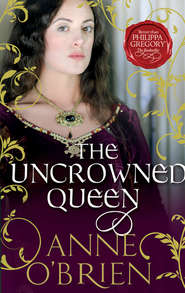По всем вопросам обращайтесь на: info@litportal.ru
(©) 2003-2025.
✖
Devil's Consort
Настройки чтения
Размер шрифта
Высота строк
Поля
But the Archbishop remained adamant. ‘To arrive before your future husband, windblown and hot, in the middle of a camp of soldiers and the usual rabble of camp followers? Less than perfect, my dear Eleanor. I think not. You will wait here. You will allow Prince Louis to come to you. As he should, of course.’ The Archbishop’s eyes twinkled with crafty appeal to my pride. ‘The Kingdom of France cannot compare with the Duchy of Aquitaine. You will stand on your dignity. You will control your impatience.’
Dignity. Control. Maturity was rushing up to meet me, so fast that it took my breath. And I knew it must be so. The days of my wilful girlhood were gone for ever.
‘How long must I wait?’
‘Not long. Tomorrow I will bring him to you.’
Another whole day. But to ride into the Capetian camp, as any common sightseer to peer and pry … No. I would not do that.
‘Tomorrow then. We will hold an audience in the Great Chamber.’
‘I will arrange it.’ The Archbishop bowed again and departed, well satisfied, as was I.
I went back to the window, straining to see if I could make out the distant figure of my future husband. I could not, of course. My gaze strayed to the nearer, familiar vista of Bordeaux. My days here were now numbered. I would have to leave all this, my well-loved home, the dry, sun-baked south. I had known Bordeaux all my life, the warm, golden walls enclosing vineyards and gardens as well as our own ducal palace. Churches with their spires arrowing to heaven. The market and port with ships landing goods from all the known world. Paris? What did I know of it? Very little, I admitted. Landlocked. Cold and damp and northern. Whatever it was, it was about to become the centre of my new life.
‘And have you decided which language you’ll use to address your most puissant Prince?’ Aelith murmured, coming up to tuck her hand through my arm. She was definitely in the mood to annoy.
‘I shall speak my own language, of course.’
‘You’ll not make it easy for him?’
‘Why should I? He’ll gain far more from this marriage than I. Our new combined kingdom …’
‘Never mind the politics, sister. You’re too solemn. Far more important—what will you wear to meet him for the first time?’
‘Aelith! Life’s not all about dresses and mantles …’
‘Sometimes it is. Which reminds me, will you lend me your pleated undergown—the blue silk patterned with silver?’
‘No.’ It was new and precious.
‘Well, if you’re of a mind to be bad-tempered …’
It was in my mind to snap at her but I could not; marriage might demand a parting between us, a thought that brought me no happiness. Moreover she had a point. It mattered that I make an impression on Louis Capet. I would make him notice me. I was Duchess of Aquitaine, not some poor petitioner to fall on her knees to beg the Capetian hand of charity to raise her from the dust.
The Devil whispered in my ear.
Are you sure you want to be bound to a man, to be dependent on his yea or nae? Is this how you see your life—at the beck and call of this unknown prince, for you to be his vassal, his possession, obedient to his commands?
No, I didn’t want it but I had no choice. I was fifteen years old, Duchess of Aquitaine and Gascony, Countess of Poitou in my own right. Unable to defend my lands from the jackals and vultures, I must bow to the inevitable. I had made up my mind to it.
I would mate with the Devil himself if it would keep Aquitaine safe.
Aelith borrowed my undergown anyway, but by then events had overtaken me: blue silk undergowns had become entirely inconsequential.
‘You are magnificent,’ Aelith observed.
I raised my chin. I knew it. True to his word, early next morning, before the heat of the day built to a furnace, Archbishop Geoffrey had himself ferried across the river to escort the Prince to meet me, his affianced wife. I sat in my audience chamber and waited for him, a vision of Aquitaine splendour.
Aelith’s advice in mind, I had chosen a gown of deep blue. To be the possessor of hair the rich red-brown of a vixen’s pelt put many colours out of bounds, but the blue of the Virgin’s robe was becoming. Beneath it I wore under-tunics of silk and fine linen, while over it a long flowing surcoat so that the full skirts lapped around me, trailing as I walked in gilded leather shoes. A jewelled belt clipped my waist with another loop around my hips. A long transparent veil secured by a gold and jewelled filet did not hide my hair but drew attention to it, braided along its length with blue and gold ribbons to hang almost to my knees. All in all a statement of imperious power—if not entirely comfortable in the sultry heat. Attention was drawn to my eyes, to my lips and cheeks by the judicious use of artificial colour. Rings flattered my hands, earrings dripped from lobe to shoulder.
And I waited.
An hour passed.
He kept me waiting.
I was not used to being kept waiting, in a life where servants leapt to do my bidding. But I would show neither anxiety nor anger. I would not go to the wall-walk to look out. I sat on my high-backed chair on the dais and stilled my fingers that wanted to tap their impatience. I watched the door at the far end of the vast chamber. The sun lifted towards noon and sweat trickled down my spine.
Still I sat. Temper began to hum beneath my skin. He dared to keep me waiting! Me, in whose veins ran the blood of a long line of victorious warrior knights. He would slight me, Eleanor …
Where was this Prince of France? By God, I’d wait no longer …!
And then the tramp of an armed guard. The soft murmur of voices. The Frankish soldiers marched into my audience chamber—much as an invading force—to position themselves into a protective phalanx at the door. But I focused on the man who came to a halt under the arched doorway, looking around with wide eyes, only stepping forward at a murmur from my Archbishop on his right.
Louis Capet walked slowly towards me. Louis le Jeune. Now that the moment was here my palms were slick with sweat. I resisted the urge to wipe them down the silk of my skirts.
The Prince halted, as if looking for encouragement.
I studied him while he was still distant from me, gaining a fistful of impressions. My heart sank. Who would I compare him with? The only men I had known, of course. My grandfather. My father. My father’s younger brother Raymond, now Prince of Antioch. With these men as my only measuring stick, I had expected a warrior, a bold knight to march forward to claim the prize, a lord with presence, as much at home in a chamber of government as in the lists or on the battlefield. As a Prince of France I had at least anticipated a supreme confidence. When the men of my family had entered a room, it had been instantly full of their authority and forceful personality.
The lingering shades of the rulers of Aquitaine faded as Prince Louis walked forward slowly, the Archbishop once again at his side with an encouraging smile. This, then, was the man I would wed. He stopped before me, bowed with elegance and smiled. As good manners dictated, I stood and, lifting the trailing hems of my skirts, stepped from the dais and held out my hand in greeting.
Louis was tall, as tall as I, for which I was grateful. His hair was long and fair, waving to his shoulders. Blue eyes, the blue of a summer sky, were direct and almost childlike in their openness. Fine features, a straight nose and austere cheeks. His mouth was well moulded, curved into a sweet, disarming smile. He had taken a razor to his cheeks and chin, his skin soft and smooth. Without doubt, as any woman would see, an attractive man.
Will he be attractive in bed?
The thought that leapt into my mind, as silkily as my rosary beads slipped through my fingers at Mass, did not surprise me. After all, what was the purpose of this union if not to safeguard the future of my domains through the begetting of a child? Would he be pleasing? I thought he would. His shoulders were broad, his figure elegant. His hands were beautiful and slender. I would not object to intimacy with this man.
‘My lady.’ His voice was soft, pleasant to the ear as he bowed again with exquisite grace.
‘My lord, you are right welcome,’ I replied in similar Latin, the formal diplomatic language of the court.
As he bent his head to press his lips to my fingers, I assessed his clothing with some surprise. His garments were of fine wool, the best I had seen, and in the most magnificent red that I did not wear but coveted—a red-haired woman would not choose to wear such a hue unless she was totally witless—but the garment was in what I would have called an outdated fashion. The overgown reached Louis’s ankles, rather than his knees, over a plain linen under-tunic that showed at neck and hem. No bands of braiding or embroidery to enhance the collar or sleeves, only minimal stitching around the neck and that without style. He wore no jewels. His belt was of good quality but plain leather, as were his boots. He had dressed well but completely without show to draw attention to his rank.
He wore no sword at his belt. The Dukes of Aquitaine wore a sword unless in the bedchamber. And even then, until persuaded to remove it by the lady who shared their sheets.
How could the heir of France not wear a sword, the ultimate symbol of power?
I pursed my lips faintly through my smile, trying not to be over-critical. So he did not like display and ostentation. That did not make him less of a man. Perhaps as a Prince of France he saw no need to emphasise his status with sword and poignard on the day he met his intended bride. But his hands and face were pale, un-weathered. The fingers that held mine bore no calluses from sword or shield or even horse harness. He was no warrior, no fighter for sure. He bore no trace of hard campaigning through rain and sun.
Neither was he finding it easy to choose what to say next to me. An awkward little silence fell between us. Which I broke.
‘I have looked forward to this moment when we would meet, my lord,’ I said.
Louis flushed, his fair skin pink as an early rose. I saw his throat convulse as he swallowed.
‘Lady. I have heard much of your beauty. The rumours were not false. Your eyes are as fine and rare as … as emeralds.’











